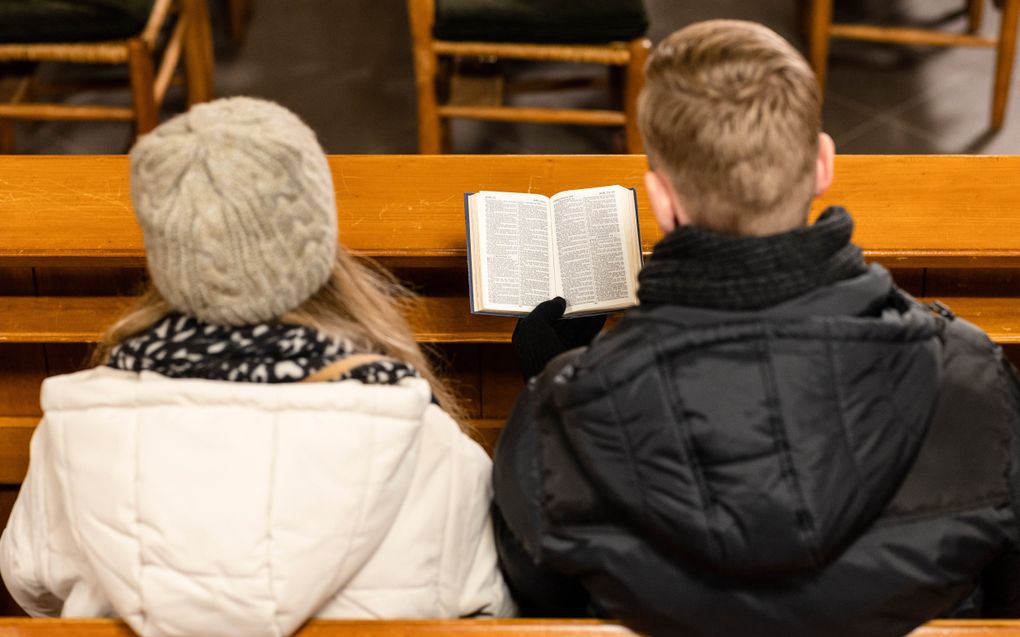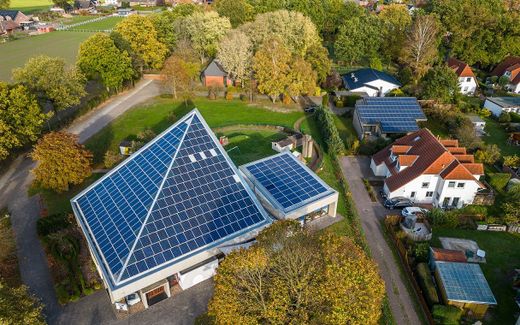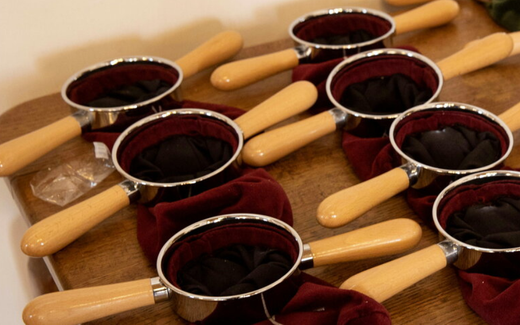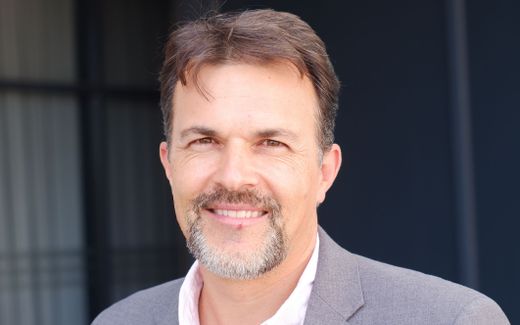European churches fear consequences of rising energy prices

Many churches in Europe lower their temperatures. That quickly saves around five to 10 per cent in costs. Photo RD, André Dorst
European Union
Gas prices remain high. A tour around Europe shows that churches are not yet concerned about their financial situation. A church that has been working on sustainability for years, sometimes to the irritation of fellow believers, can now count on interest from other churches.
Churches have barely recovered from falling attendance numbers during the pandemic. Now, the next worry presents itself: high energy bills and inflation. A tour of several churches on the European continent offers an unequivocal picture: this winter is bearable, but next year will be complicated because of high prices. In addition, the private financial situation of church members is a source of concern for many churches.
Anna Kampl is especially concerned about her church members' own wallets. Kampl is the pastor of a Protestant congregation in Simmering, a suburb of Vienna, Austria. Around forty people attend worship services every week. "We are a quite poor suburban congregation," Kampl explains. "The people here don't earn that much, and the income from church contributions is therefore much lower than in the inner suburbs of Vienna." It is, therefore, also not possible for the congregation to connect to district heating; the connection costs of 40,000 euros are unaffordable.
Thus, Kampl has to be careful with turning on the heating. Yet, it is cheaper now than last spring: the congregation switched to electric infrared heating this summer. This is more environmentally friendly and cheaper than gas, thus offering a little more financial leeway. However, there is only limited scope to make the church more sustainable.
Monument
The church building, a white and square complex, was designed by renowned architect Roland Rainer. "Because our church is listed as a monument, we have to discuss all renovations with the monumental agency," says Kampl. Nevertheless, it is possible to make the church more sustainable in some ways; the installation of solar panels is planned for next year. "In doing so, we have to hope for government subsidies."
The church centre uses gas, so the congregation is not completely off the gas. "We expect the bill to be about three times higher than last year. That means we have to be very careful with heating. Church meetings are, therefore, only in the pastor's office, which is heated by a heat pump."
High energy prices are not the first setback Kampls congregation has suffered in recent years. Since the pandemic, church attendance has declined by a third. Still, Kampl is somewhat positive about the current period. "Every Sunday, we open our congregation centre to people who want to be a bit warmer or have something to eat and drink. We offer that for free." Both older and younger people take advantage of this. "That, in turn, makes our community stronger."
That close-knit community should also transcend church walls, according to Kampl. "I would like to see more solidarity from the wealthier church congregations in Vienna. It is the task of us as Christians to bear burdens together. Those who earn well should share with the poor. That's how the church works."
Irregular churchgoers
There are also concerns about energy prices in Sweden. The country, unlike many other countries, has different energy zones. The northern part of the Scandinavian country generates more energy than it consumes. In the south, it is the other way around. "Energy prices are, therefore, significantly higher in the south than in the north of the country," explains Magdalena Boork.
Boork is the national energy coordinator for the Church of Sweden. To help local congregations, the dioceses, in collaboration with the national church, established a network in which congregations help each other and give tips.
The Swedish government is also assisting its citizens. It plans to support the more severely affected southern part of the country with their energy bills. "For this, church congregations will also be eligible," says the minister.

But congregations are also actively saving money themselves. For example, some congregations relocate or merge services with neighbouring congregations. "It is nothing new to close church buildings during winter," Boork explains. "Even before this expensive period, we closed churches in winter to save energy. Most churches, however, will still be open for funerals and baptisms."
The attendance figures of Swedish churches have still not fully recovered since the pandemic, Boork observes. Still, more people are coming back to church for help these days. "Although Swedes are generally not regular churchgoers, they still see the church as a stable institution in times of crisis."
According to Boork, current energy prices are putting financial pressure on everyone. "At the same time, the Swedish church is spread throughout the country. So the situation varies considerably from one congregation to another." In addition, statistics show that Swedes are adapting quickly to current energy prices. Swedish households reduced their electricity consumption by almost a fifth. These figures match those of the Church of Sweden.
Climate change
People in Byarum, a rural municipality in southern Sweden, will not close their churches. Instead, they will lower their heating. "Normally, it is about 20 to 21 degrees during worship services. Now it remains 19 degrees," says Lars Andersson, who manages the church buildings. Around 50 people attend church services every week. According to Andersson, each degree of heating saves about 5 per cent in costs. How much the congregation saves in total has yet to be made clear.
Andersson has yet to see any financial problems this winter. "In our congregation, people are financially in good shape for the time being," he says. However, if prices remain high for a long time, he does foresee problems. "Maybe we will have to step in diaconally, but there is no question of that at the moment."

As in Austria, Andersson signals a decline in Sunday attendance since the pandemic. On the net, however, the congregation does reach more people. "Fewer people come to church, but digitally we reach a larger group than before corona."
Still, not all Swedish churches are without struggle. In the city of Västerås, west of Stockholm, 15 churches are closing their doors. That is half of all Lutheran churches in that city. Reason: energy. "The sharply rising electricity prices are a challenge, as is climate change. Here we want to take social responsibility," says administrator Eva Carlin on the Swedish Church's website. Closing the churches will save the Swedish Church some 90,000 euros this winter.
Woodburning
The Evangelical Lutheran Church in the northern German town of Lütau, near Hamburg, is not bothered by high gas prices. This congregation has been working on making its buildings more sustainable for more than a decade. A wood-burning boiler heats the church building, the rectory and the daycare centre, among others.
The congregation gets the necessary wood from its own plots land, explains Michael Eggers. As a volunteer, he is closely involved in his congregation's climate project. The congregation is self-sufficient and thus no longer needs gas. Nevertheless, it took measures against this winter. "We adjusted the temperature downwards. Although our heating system is climate-neutral, we also want to save energy."
Stove
Not only in Lütau church, the heating is turned down. In March, the Nordkirche, the association of northern Protestant churches in Germany, called for lowering the temperature for the sake of the climate. All districts responded to that, says Michael Birgden, spokesman for the Nordkirche. "Exceptions are possible, but local congregations regulate that themselves."
Turning down the heating offers considerable cost savings, says Birgden. "If all gas-heated churches turn the temperature down one degree, the Nordkirche will save some 240,000 euros a year. German churches should not expect special help from the government for the time being. However, like companies and private individuals, they do benefit from government schemes with energy suppliers.
Although the congregation in Lütau does not spend money on gas, the costs for electricity and fuel remain high. That is why there is a plan to install solar panels in the near future.
Awake
Lütau church is thus not worried about high gas prices for their church. Yet, becoming climate-neutral has not been an easy path, says Johanna Lembcke, pastor of the congregation. "We sometimes had to push for innovations and the necessary money to the irritation of the national church. For example, they did not see the added value of wood-fired heating at the time."
That added value is now clear. Since the Russian invasion of Ukraine, the German congregation has been getting many questions from other churches about their climate project. "For ten years, we were frowned upon, but since the war, there has suddenly been understanding and interest." Even the national church is looking at Lütau with interest, says Lembcke.

Still, there are also concerns in Lütau, a rural town of about 700 inhabitants. Lembcke: "Many people live in large, poorly insulated farms. That causes high heating costs." The small church congregation has no money to help these people. Yet there are other options, such as so-called warming rooms. Church congregations open heated rooms where people in need can warm up.
Despite the concerns, there is currently little cooperation between local congregations. While several churches in the area are only filled half during worship meetings, they do not choose to combine services. That is out of habit, says Lembcke. "People have sometimes been going to the same church every Sunday for 50 years. Then it is difficult to establish a new pattern." Despite the lack of cooperation, Lembcke says there is no lack of solidarity between congregations. However, someone has to take a first step.
According to Lembcke, who has been working in Lütau since 2021, Lütau's long-standing project shows that there is always a way to save energy, although the situation can vary from church to church. "We live in a wooded area. That gives opportunities for a wood-fired boiler. Every church should look at its surroundings to see where gains can be made.
The current concerns among churches are an important lesson for Lembcke: "Don't resign yourself to a 'no' when you want to innovate. The effort the Lütau congregation took is now paying off."
Norway not bothered by energy price

One of Europe's northernmost Protestant churches barely notices higher energy prices. However, the effects of the corona pandemic are still being felt.
For Tromsø Cathedral in Norway, it is almost a winter like any other. The Protestant congregation does not use gas but hydropower to generate heat. Although Norway is rich in gas, it exports almost everything abroad, explains church warden Oddgeir Albertsen. "Prices haven't really changed. In summer, energy is always cheaper than in winter, so that's the only price difference we have to deal with."
Tromsø is located above the Arctic Circle. This results in short days; in early January, it is not light for more than five hours a day. Yet this does not affect Norwegians' daily routine or church attendance. Every week, about 50 people attend the Sunday service. In addition, tourists regularly visit the church.
Since corona, church attendance is down, though, Albertsen signals. "We stopped online services because we want to get people back to church, but the current attendance is lower than before the pandemic." The effect of the pandemic is also visible in other parts of church life in Tromsø. "We have fewer volunteers, and people are more on their own."
Despite stable energy prices, there are also financial concerns in Tromsø. "Inflation and interest rate increases are increasing interest in our social projects," Albertsen says. Corona caused people to withdraw from social life and thus created loneliness."
Dutch churches turn down the heating
With winter just around the corner and gas prices "extremely expensive", many churches are deciding to turn down the heat from 1 January. How are they dealing with this in the Netherlands? Reporter Robert visits, among others, church warden Jan Quintus Zwart, who expects that on a good winter's day the temperature could be just a few degrees.
Related Articles






